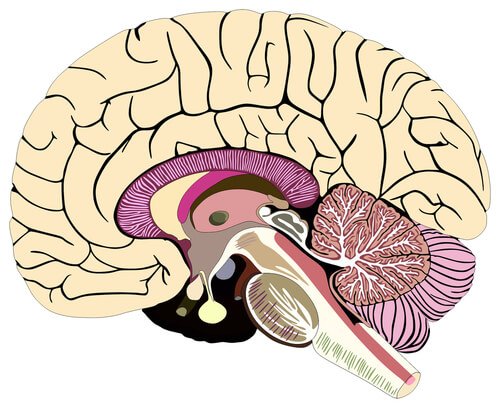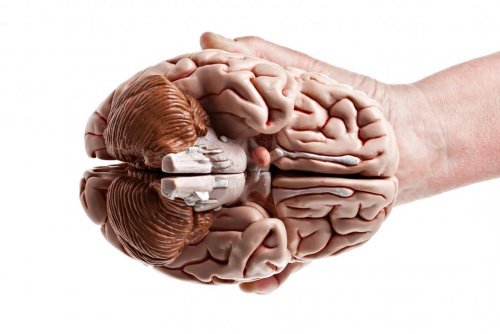What are the Functions of the Hypothalamus?

The hypothalamus is an area of the brain that has many functions despite its small size. It plays an important role in the production of hormones. In addition, it helps stimulate many important processes.
Thus, when the hypothalamus doesn’t work properly, it can cause organic problems that can lead to many disorders. On the other hand, although hypothalamic diseases are rare, it’s essential to keep this brain area healthy in order to reduce the risk.
The word hypothalamus comes from the Greek word: υπο–θάλαμος, which means ‘under the chamber.’ The hypothalamus is a small area of the brain that’s located below the thalamus and above the pituitary gland. Even though it’s small in size, it influences both the endocrine and nervous systems.
Functions of the hypothalamus
Homeostasis refers to the state of organic balance. Now, the body is always trying to achieve or improve this balance. Thus, the main job of the hypothalamus is to regulate different processes in order to achieve it.
To do this, the hypothalamus acts as the connector between the endocrine and nervous systems. In fact, it’s involved in many essential bodily functions, such as regulating body temperature, thirst, and appetite.
It also interferes in the regulation of emotions, sleep cycles, childbirth, blood pressure, and heart rate. Moreover, it exerts influence in the production of digestive juices and the balancing of body fluids. Additionally, experts consider that the substances that spark anger, sadness, the feeling of falling in love, and sexual satisfaction are produced in the hypothalamus.

Hormones of the hypothalamus
To maintain this balance, the hypothalamus is greatly responsible for the functioning of the endocrine system. Moreover, it also has a close relationship with the pituitary gland, which produces other important hormones.
That being said, the hypothalamus and the pituitary gland work together to control the entire endocrine system, including the glands that produce different types of hormones, such as the adrenal glands, the kidneys, and the thyroid gland.
Here are some of the hormones secreted by the hypothalamus:
- The antidiuretic hormone. It increases the amount of water that the kidneys absorb from the blood.
- Corticotropin-releasing hormones. These hormones help regulate metabolism and immune response. They work with the pituitary gland and the adrenal gland to release certain steroids.
- The gonadotropin-releasing hormones, which tell the pituitary gland to release hormones to keep the sex organs functioning.
- Oxytocin. This hormone plays a role in many processes, including the release of breast milk, body temperature, and mothers’ sleep cycles.
- Hormones that control prolactin, which tell the pituitary gland to start or stop the production of breast milk in nursing mothers.
- Thyrotropin-releasing hormone. It activates the thyroid, releasing the hormones that regulate metabolism, energy levels, and growth.
- Growth hormones, which tell the pituitary gland to increase or reduce the levels of other hormones.
Hypothalamic diseases
Hypothalamic diseases are disorders that prevent the hypothalamus from functioning properly. They’re very difficult to diagnose.
The hypothalamus also plays the role of telling the pituitary gland to release hormones to the rest of the endocrine system. Most doctors find it difficult to diagnose which gland isn’t working properly, which is why these disorders are often called hypothalamic-pituitary disorders. In these cases, some tests that evaluate the functioning of the endocrine system are able to give clues to identify the root of the disorder.
The most common causes of hypothalamic diseases are head injuries in which the hypothalamus was affected. Surgeries, radiation, and tumors can also impact the hypothalamus. In some cases, hypothalamic diseases may also be caused by genetic factors.

Other possible causes of hypothalamic diseases:
- Eating disorders such as bulimia or anorexia.
- Diets high in saturated fats.
- Genetic disorders that cause excessive iron accumulation in the body.
- Malnutrition.
- Inflammation.
- Infections.
- Excessive bleeding.
How to take care of the hypothalamus
Given that the hypothalamus plays such a vital role, it’s extremely important to take care of it and keep it healthy. Although it’s impossible to stop genetic predisposition, there are some dietary steps you can take to help make it work better.
The hypothalamus controls appetite. In fact, the food we consume exerts a big influence on it. Studies have shown that diets high in saturated fats can alter the part of the hypothalamus that regulates hunger and energy expenditure.
Experts also have found that diets rich in saturated fats have an inflammatory effect on the body. This can affect the immune system, increasing the chances of it turning on the body’s healthy cells, increasing intestinal inflammation and altering the body’s natural functioning.
Diets rich in polyunsaturated fats, such as omega-3 fatty acids, can help reverse or attenuate this inflammation. These fats are a safe alternative to other types of oils and fats. Among the foods high in omega-3, we have fish, nuts, flax seeds, and green vegetables.
In addition, to favor the health of the hypothalamus and improve brain function, we must consume fruits and vegetables rich in vitamins, especially vitamin C and B vitamins.
Lastly, we must note that the hypothalamus is one of the most important parts of the body. However, we rarely notice its existence until it starts to malfunction. Being careful with what we eat can help keep it functioning properly to reduce the risk of many diseases.
The hypothalamus is an area of the brain that has many functions despite its small size. It plays an important role in the production of hormones. In addition, it helps stimulate many important processes.
Thus, when the hypothalamus doesn’t work properly, it can cause organic problems that can lead to many disorders. On the other hand, although hypothalamic diseases are rare, it’s essential to keep this brain area healthy in order to reduce the risk.
The word hypothalamus comes from the Greek word: υπο–θάλαμος, which means ‘under the chamber.’ The hypothalamus is a small area of the brain that’s located below the thalamus and above the pituitary gland. Even though it’s small in size, it influences both the endocrine and nervous systems.
Functions of the hypothalamus
Homeostasis refers to the state of organic balance. Now, the body is always trying to achieve or improve this balance. Thus, the main job of the hypothalamus is to regulate different processes in order to achieve it.
To do this, the hypothalamus acts as the connector between the endocrine and nervous systems. In fact, it’s involved in many essential bodily functions, such as regulating body temperature, thirst, and appetite.
It also interferes in the regulation of emotions, sleep cycles, childbirth, blood pressure, and heart rate. Moreover, it exerts influence in the production of digestive juices and the balancing of body fluids. Additionally, experts consider that the substances that spark anger, sadness, the feeling of falling in love, and sexual satisfaction are produced in the hypothalamus.

Hormones of the hypothalamus
To maintain this balance, the hypothalamus is greatly responsible for the functioning of the endocrine system. Moreover, it also has a close relationship with the pituitary gland, which produces other important hormones.
That being said, the hypothalamus and the pituitary gland work together to control the entire endocrine system, including the glands that produce different types of hormones, such as the adrenal glands, the kidneys, and the thyroid gland.
Here are some of the hormones secreted by the hypothalamus:
- The antidiuretic hormone. It increases the amount of water that the kidneys absorb from the blood.
- Corticotropin-releasing hormones. These hormones help regulate metabolism and immune response. They work with the pituitary gland and the adrenal gland to release certain steroids.
- The gonadotropin-releasing hormones, which tell the pituitary gland to release hormones to keep the sex organs functioning.
- Oxytocin. This hormone plays a role in many processes, including the release of breast milk, body temperature, and mothers’ sleep cycles.
- Hormones that control prolactin, which tell the pituitary gland to start or stop the production of breast milk in nursing mothers.
- Thyrotropin-releasing hormone. It activates the thyroid, releasing the hormones that regulate metabolism, energy levels, and growth.
- Growth hormones, which tell the pituitary gland to increase or reduce the levels of other hormones.
Hypothalamic diseases
Hypothalamic diseases are disorders that prevent the hypothalamus from functioning properly. They’re very difficult to diagnose.
The hypothalamus also plays the role of telling the pituitary gland to release hormones to the rest of the endocrine system. Most doctors find it difficult to diagnose which gland isn’t working properly, which is why these disorders are often called hypothalamic-pituitary disorders. In these cases, some tests that evaluate the functioning of the endocrine system are able to give clues to identify the root of the disorder.
The most common causes of hypothalamic diseases are head injuries in which the hypothalamus was affected. Surgeries, radiation, and tumors can also impact the hypothalamus. In some cases, hypothalamic diseases may also be caused by genetic factors.

Other possible causes of hypothalamic diseases:
- Eating disorders such as bulimia or anorexia.
- Diets high in saturated fats.
- Genetic disorders that cause excessive iron accumulation in the body.
- Malnutrition.
- Inflammation.
- Infections.
- Excessive bleeding.
How to take care of the hypothalamus
Given that the hypothalamus plays such a vital role, it’s extremely important to take care of it and keep it healthy. Although it’s impossible to stop genetic predisposition, there are some dietary steps you can take to help make it work better.
The hypothalamus controls appetite. In fact, the food we consume exerts a big influence on it. Studies have shown that diets high in saturated fats can alter the part of the hypothalamus that regulates hunger and energy expenditure.
Experts also have found that diets rich in saturated fats have an inflammatory effect on the body. This can affect the immune system, increasing the chances of it turning on the body’s healthy cells, increasing intestinal inflammation and altering the body’s natural functioning.
Diets rich in polyunsaturated fats, such as omega-3 fatty acids, can help reverse or attenuate this inflammation. These fats are a safe alternative to other types of oils and fats. Among the foods high in omega-3, we have fish, nuts, flax seeds, and green vegetables.
In addition, to favor the health of the hypothalamus and improve brain function, we must consume fruits and vegetables rich in vitamins, especially vitamin C and B vitamins.
Lastly, we must note that the hypothalamus is one of the most important parts of the body. However, we rarely notice its existence until it starts to malfunction. Being careful with what we eat can help keep it functioning properly to reduce the risk of many diseases.
This text is provided for informational purposes only and does not replace consultation with a professional. If in doubt, consult your specialist.







